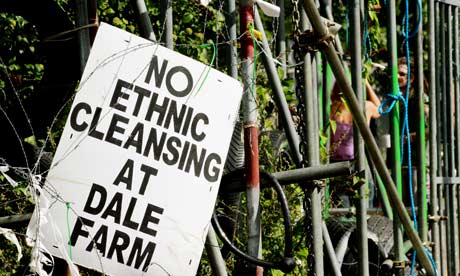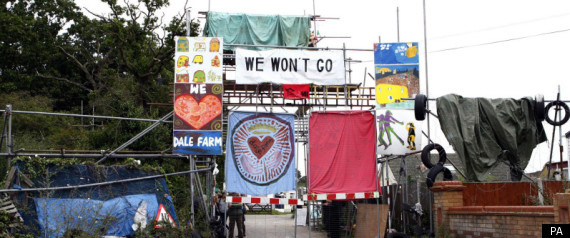| The New |
 |
| The Old |
While I sympathise and understand the position of those in favour of the removal of the travellers on the basis that they were not legally permitted to live on the land that makes up Dale Farm, I cannot make myself agree with their removal. In a time of endemic job and budget cuts in all sectors justifying the £18 million removal costs (which does not include 10 years worth of legal fees) would seem a tall order when their removal from Dale Farm does not ‘solve’ the issue rather it simply sends travellers in pursuit of another area in which to live.
 The land which makes up Dale Farm legally belongs to the travellers, it was purchased outright in the 90’s and there are some legal builds on the property, the destruction of Dale Farm is only for those who’s caravans are pitched there without planning permission. As someone who lives in a rural area where several utterly terrible homes have been built on isolated land which did not have planning permission but that had been cleared for planning after the fact, it would seem hard to justify why a site which has limited planning permission would be refused an extension.
The land which makes up Dale Farm legally belongs to the travellers, it was purchased outright in the 90’s and there are some legal builds on the property, the destruction of Dale Farm is only for those who’s caravans are pitched there without planning permission. As someone who lives in a rural area where several utterly terrible homes have been built on isolated land which did not have planning permission but that had been cleared for planning after the fact, it would seem hard to justify why a site which has limited planning permission would be refused an extension. Furthermore, I was surprised to discover that 90% of planning applications by members of the Irish travelling community were rejected as opposed to only 20% of applications by members of the settled community. If ‘traveller’ was removed from this equation and any other ethnic group was substituted there would be accusations of institutional racism abound, especially when coupled with the glaring reality that by forcing travellers to only live on government sanctioned sites amounts to ghettoization.
 The American social critic and novelist Henry Miller wrote that “the study of crime begins with the knowledge of oneself, all that you despise, all that you loathe, all that you reject, all that you condemn and seek to convert by punishment, springs from you.” (Henry Miller 1945 in Lloyd 1977 P47) This definition of the social construction of crime ascribed to by Miller in the mid 1940’s has been altered very little by the passage of time. Society has a tendency to criminalise that which is branded as ‘deviant’, as such the definition of a ‘criminal act’ is very much a subjective term, depending on the socio-political construction of the society that an individual inhabits. With this in mind the destruction of Dale Farm would seem to be nothing more than the excessive punishment for the deviant for crimes for which the ‘acceptable’ person is given a slap on the wrists. I know this opinion is unlikely to be popular, and it is true that the law is applied to everyone but contrary to popular acceptance there are gradations of criminal and gradations of punishment and in this instance I believe the reaction to be excessive.
The American social critic and novelist Henry Miller wrote that “the study of crime begins with the knowledge of oneself, all that you despise, all that you loathe, all that you reject, all that you condemn and seek to convert by punishment, springs from you.” (Henry Miller 1945 in Lloyd 1977 P47) This definition of the social construction of crime ascribed to by Miller in the mid 1940’s has been altered very little by the passage of time. Society has a tendency to criminalise that which is branded as ‘deviant’, as such the definition of a ‘criminal act’ is very much a subjective term, depending on the socio-political construction of the society that an individual inhabits. With this in mind the destruction of Dale Farm would seem to be nothing more than the excessive punishment for the deviant for crimes for which the ‘acceptable’ person is given a slap on the wrists. I know this opinion is unlikely to be popular, and it is true that the law is applied to everyone but contrary to popular acceptance there are gradations of criminal and gradations of punishment and in this instance I believe the reaction to be excessive. 

No comments:
Post a Comment